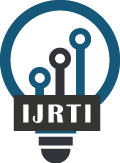|
International Journal for Research Trends and Innovation
International Peer Reviewed & Refereed Journals, Open Access Journal
ISSN Approved Journal No: 2456-3315 | Impact factor: 8.14 | ESTD Year: 2016
Scholarly open access journals, Peer-reviewed, and Refereed Journals, Impact factor 8.14 (Calculate by google scholar and Semantic Scholar | AI-Powered Research Tool) , Multidisciplinary, Monthly, Indexing in all major database & Metadata, Citation Generator, Digital Object Identifier(DOI)
|
Issue: December 2025
Volume 10 | Issue 12
Review Result and Publication of Paper within : 2-3 days
Click Here For more DetailsFor Authors
Forms / Download
Published Issue Details
Editorial Board
Other IMP Links
Facts & Figure
Impact Factor : 8.14
Issue per Year : 12
Volume Published : 10
Issue Published : 115
Article Submitted : 19688
Article Published : 8087
Total Authors : 21392
Total Reviewer : 770
Total Countries : 147
Indexing Partner
Licence
This work is licensed under a Creative Commons Attribution-NonCommercial 4.0 International License







|
Published Paper Details
|
|
| Paper Title: | Comparative Analysis of Prediction and Forecasting Of Covid 19 Using Regression Algorithms and Forecasting Models in Various Indian States |
| Authors Name: | Kavitha Rajalakshmi. D , Dr. Bharathisindhu |
| Download E-Certificate: | Download |
| Author Reg. ID: |
IJRTI_184631
|
| Published Paper Id: | IJRTI2211073 |
| Published In: | Volume 7 Issue 11, November-2022 |
| DOI: | |
| Abstract: | The worldwide ongoing novel Coronavirus (COVID-19) pandemic has infected millions of people and claimed lakhs of lives. To avoid deaths, it is vital to identify future infected cases and the rate at which the virus spreads to prepare clinics in advance. It presents a challenge for the research community to make accurate predictions about the spread of COVID-19 in the real world. In order to determine cumulative cases for various Indian states, we use day level information of COVID-19 spread for cumulative cases from the top five mostly affected states in India; Maharashtra, Kerala, Karnataka, Tamil Nadu and Andhra Pradesh. A time series of Coronavirus spread between March 12, 2020, and June 06, 2022 is used to analyze the temporal data. The COVID-19 outbreak is modeled using prediction models such as Linear Regression, Support Vector Regression, Naive Bayes, Decision Tree Regression, Random Forest Regression, and time series forecasting models such as ARIMA, Holt, and Prophet. Mean Absolute Error, Mean Square Error, Root Mean Square Error, Root Mean Square Log Error, and R Squared metrics are used to evaluate the effectiveness of the models. By analyzing the outbreak trends, we can gain a better understanding of how the disease is spreading. Our study also suggests that among the prediction models Random Forest Regression performs better than other prediction models and among time series forecasting models Prophet model performs better than ARIMA Model and Holt Model at this task of forecasting the outbreak and overall Random Forest Regression model is better compared to all the other models. As a result of the forecasting results, a government may be able to plan policies that will help contain the virus spread. |
| Keywords: | Linear Regression, Support Vector Regression, Naive Bayes, Decision Tree Regression, Random Forest Regression, Prophet Model, Holt Model, ARIMA Model |
| Cite Article: | "Comparative Analysis of Prediction and Forecasting Of Covid 19 Using Regression Algorithms and Forecasting Models in Various Indian States", International Journal of Science & Engineering Development Research (www.ijrti.org), ISSN:2455-2631, Vol.7, Issue 11, page no.512 - 520, November-2022, Available :http://www.ijrti.org/papers/IJRTI2211073.pdf |
| Downloads: | 000205247 |
| ISSN: |
2456-3315 | IMPACT FACTOR: 8.14 Calculated By Google Scholar| ESTD YEAR: 2016 An International Scholarly Open Access Journal, Peer-Reviewed, Refereed Journal Impact Factor 8.14 Calculate by Google Scholar and Semantic Scholar | AI-Powered Research Tool, Multidisciplinary, Monthly, Multilanguage Journal Indexing in All Major Database & Metadata, Citation Generator |
| Publication Details: |
Published Paper ID: IJRTI2211073
Registration ID:184631
Published In: Volume 7 Issue 11, November-2022
DOI (Digital Object Identifier):
Page No: 512 - 520 Country: Pollachi, Tamilnadu, India Research Area: Master of Computer Application Publisher : IJ Publication Published Paper URL : https://www.ijrti.org/viewpaperforall?paper=IJRTI2211073 Published Paper PDF: https://www.ijrti.org/papers/IJRTI2211073 |
| Share Article: | |
|
Click Here to Download This Article |
|
| Article Preview | |
|
|
|
Major Indexing from www.ijrti.org
| Google Scholar | ResearcherID Thomson Reuters | Mendeley : reference manager | Academia.edu |
| arXiv.org : cornell university library | Research Gate | CiteSeerX | DOAJ : Directory of Open Access Journals |
| DRJI | Index Copernicus International | Scribd | DocStoc |
ISSN Details
 |
 |
ISSN: 2456-3315
Impact Factor: 8.14 and ISSN APPROVED,
Journal Starting Year (ESTD) : 2016
DOI (A digital object identifier)
 Providing A digital object identifier by DOI.ONE How to Get DOI? |
Conference
Open Access License Policy
Important Details
Join RMS/Earn 300
WhatsApp
Click Here
Click Here
Indexing Partner |
|||
| Copyright © 2025 - All Rights Reserved - IJRTI | |||






